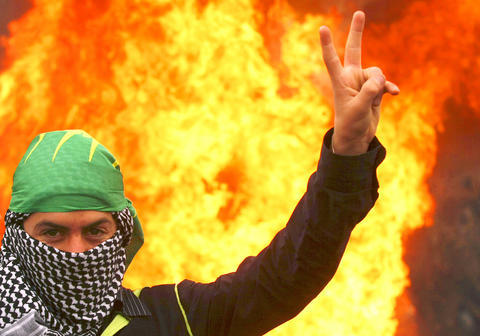A third day of unrest in the Kurdish region of southeast Turkey on Sunday left two people dead and two police officers injured, officials and witnesses said on Sunday.
Violence erupted when celebrations to mark March 21 -- Nowruz Day, or the Kurdish new year -- degenerated into protests in favor of separatist Kurdish rebels and the authorities banned gatherings in some cities.
A 20-year-old man died from a bullet wound in Yuksekova town, where riot police clashed with hundreds of protestors who took to the streets in defiance of the ban, hospital sources said.

PHOTO: AP
Two policemen were slightly injured when a bomb, believed to be a small device designed to make loud noise rather than to kill, exploded in the street as the security forces chased protesters, witnesses said.
At least five demonstrators and another policeman were injured, as police fired warning shots in the air and used tear gas and water cannon on the crowd.
Shouting slogans in favor of the separatist Kurdistan Workers' Party (PKK), masked youths hurled stones at the security forces, set barricades and fires in the street and broke shop windows.
Police blamed the unrest on the Kurdish Democratic Society Party (DTP), which organized the gathering despite a decision by local authorities to allow the celebrations only on Friday.
Dozens of people, including police officers, have been injured and more than 300 rounded up across Turkey since Friday when the disturbances began after initially peaceful celebrations.
Violence also erupted on Sunday in the western city of Izmir, home to a large Kurdish migrant community from the southeast, and 20 people were detained, Anatolia news agency reported.
The demonstrators attacked police with chunks of concrete that they dismantled from the pavement, breaking also the windows of buildings and cars, the agency said.
The DTP provincial chairman in Izmir was detained on Saturday after allegedly calling for a "Nowruz rebellion," along with several other people who were in the procession throwing Molotov cocktails.
The largest Nowruz gathering on Sunday took place under tight security in Istanbul and was largely peaceful.
Thousands of people danced, sang and waved flags of green, yellow and red -- the traditional Kurdish colors -- as police helicopters overflew the event.
Police detained 14 people who brandished portraits of jailed PKK leader Abdullah Ocalan and chanted pro-PKK slogans, NTV TV reported.
Meanwhile, a Turkish court filed charges yesterday against the leader of a small leftist political party in a probe into a shadowy network of extreme nationalists who allegedly sought to topple the Islamic-rooted government.
The court in Istanbul charged Dogu Perincek with "being a senior official of a terrorist organization and obtaining and possessing classified documents."
Perincek is the leader of the PKK, which won a tiny fraction of the votes in general elections last summer. Last year, a Swiss court convicted Perincek of racism for denying that the mass killing of Armenians in the early 20th century was genocide.
A retired military commander and a lawyer were among those arrested earlier and reports said they were suspected of plotting to murder Turkish novelist Orhan Pamuk, who was prosecuted under a law barring insults to Turkish identity.

When Shanghai-based designer Guo Qingshan posted a vacation photo on Valentine’s Day and captioned it “Puppy Mountain,” it became a sensation in China and even created a tourist destination. Guo had gone on a hike while visiting his hometown of Yichang in central China’s Hubei Province late last month. When reviewing the photographs, he saw something he had not noticed before: A mountain shaped like a dog’s head rested on the ground next to the Yangtze River, its snout perched at the water’s edge. “It was so magical and cute. I was so excited and happy when I discovered it,” Guo said.

TURNAROUND: The Liberal Party had trailed the Conservatives by a wide margin, but that was before Trump threatened to make Canada the US’ 51st state Canada’s ruling Liberals, who a few weeks ago looked certain to lose an election this year, are mounting a major comeback amid the threat of US tariffs and are tied with their rival Conservatives, according to three new polls. An Ipsos survey released late on Tuesday showed that the left-leaning Liberals have 38 percent public support and the official opposition center-right Conservatives have 36 percent. The Liberals have overturned a 26-point deficit in six weeks, and run advertisements comparing the Conservative leader to Trump. The Conservative strategy had long been to attack unpopular Canadian Prime Minister Justin Trudeau, but last month he

Chinese authorities said they began live-fire exercises in the Gulf of Tonkin on Monday, only days after Vietnam announced a new line marking what it considers its territory in the body of water between the nations. The Chinese Maritime Safety Administration said the exercises would be focused on the Beibu Gulf area, closer to the Chinese side of the Gulf of Tonkin, and would run until tomorrow evening. It gave no further details, but the drills follow an announcement last week by Vietnam establishing a baseline used to calculate the width of its territorial waters in the Gulf of Tonkin. State-run Vietnam News

PROBE: Last week, Romanian prosecutors launched a criminal investigation against presidential candidate Calin Georgescu accusing him of supporting fascist groups Tens of thousands of protesters gathered in Romania’s capital on Saturday in the latest anti-government demonstration by far-right groups after a top court canceled a presidential election in the EU country last year. Protesters converged in front of the government building in Bucharest, waving Romania’s tricolor flags and chanting slogans such as “down with the government” and “thieves.” Many expressed support for Calin Georgescu, who emerged as the frontrunner in December’s canceled election, and demanded they be resumed from the second round. George Simion, the leader of the far-right Alliance for the Unity of Romanians (AUR), which organized the protest,